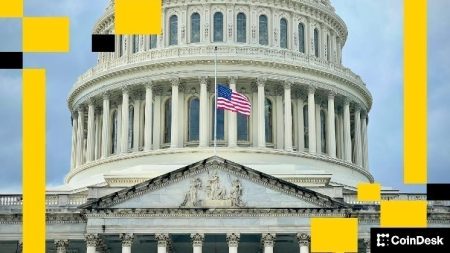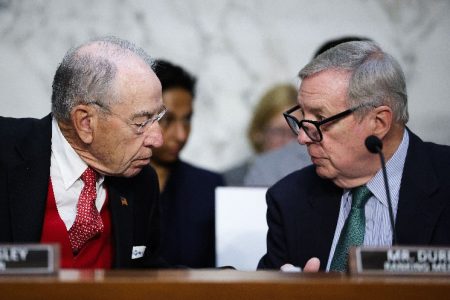Cryptocurrency Regulation Bill Advances in Senate Despite Government Shutdown
Legislative Momentum Builds as Senate Committees Draft Competing Crypto Frameworks
By Sarah Mitchell, Financial Technology Correspondent
In a significant development for the cryptocurrency industry, Senate committees are making progress on regulatory legislation despite the ongoing government shutdown. Following the US House of Representatives’ approval of the CLARITY Act in July 2025, the focus has shifted to the Senate’s version of the bill, which represents a crucial step toward establishing comprehensive cryptocurrency regulation in the United States.
The push for cryptocurrency legislation comes at a pivotal time when digital assets have become increasingly mainstream, yet operate in a regulatory environment many industry leaders describe as ambiguous. The current legislative efforts aim to provide clarity for businesses, investors, and regulators while positioning the United States as a leader in financial innovation.
Senate Agriculture Committee Pursues Bipartisan Approach
Despite the challenges posed by the government shutdown, the Senate Agriculture Committee is actively working on its version of cryptocurrency legislation. Committee Chairman John Boozman’s office confirmed to Unchained that negotiations are progressing in a constructive manner.
“This is a deliberate and good-faith negotiation process,” a spokesperson for the Senate Agriculture Committee said. “We are committed to securing bipartisan support within the committee.”
While no specific timeline has been announced, this statement has been received positively by cryptocurrency stakeholders who have faced regulatory uncertainty during the government shutdown. The involvement of the Agriculture Committee is crucial because it oversees the Commodity Futures Trading Commission (CFTC), which would play a significant role in regulating digital assets under most proposed frameworks.
Competing Legislative Proposals Reveal Different Regulatory Visions
The Senate currently has multiple cryptocurrency market structure proposals under consideration, highlighting differing perspectives on how digital assets should be regulated. In September, Democratic Senators Andy Kim, Ruben Gallego, Mark Warner, Kirsten Gillibrand, and Cory Booker introduced a framework document that focuses on addressing regulatory gaps and clarifying the legal status of various cryptocurrency assets.
Running parallel to this effort is the Republican-backed Responsible Financial Innovation Act (RFIA), which differs substantially from the House-approved CLARITY Act. The RFIA proposes a “hybrid” regulatory structure that would divide oversight responsibilities between the Securities and Exchange Commission (SEC) and the CFTC. Notably, it introduces a category of “ancillary assets”—digital assets connected to investment contracts but not classified as traditional securities—which would be subject to different regulatory treatment.
These competing visions underscore the complexity of creating effective cryptocurrency regulation that balances investor protection with support for innovation. The forthcoming draft from the Agriculture Committee will likely attempt to bridge some of these differences, representing an important step in the legislative process.
Procedural Challenges and Committee Jurisdictions Complicate Path Forward
Unlike in the House of Representatives, legislation in the Senate cannot be simultaneously assigned to multiple committees, creating additional procedural hurdles. The CLARITY Act has been formally referred to the Senate Banking Committee, but the Agriculture Committee must also be involved due to certain provisions falling under CFTC jurisdiction.
Kara Calvert, Coinbase’s US Vice President of Policy, explained the intricacies of the situation: “The Banking Committee is working hard to secure bipartisan support, and so is the Agriculture Committee. The question is how the timing of these two processes will align.”
This dual-committee approach has created a complex legislative path that requires careful coordination. Further complicating matters, the CFTC staff’s limited availability during the government shutdown has slowed the process. Additionally, uncertainty surrounding the CFTC’s leadership—with President Trump’s withdrawal of Brian Quintenz’s nomination for permanent chair—has left the commission under interim leadership at a critical juncture for cryptocurrency regulation.
Regulatory Agency Leadership Signals Potential Approach
Recent developments indicate that regulatory philosophies may be evolving. SEC Chairman Paul Atkins and CFTC Interim Chair Caroline Pham recently issued a joint statement suggesting an expanded role for the SEC in spot cryptocurrency markets. However, industry observers note that this approach could shift significantly if a new CFTC chair is appointed.
The regulatory landscape is further complicated by philosophical differences between the agencies. Historically, the SEC has taken a more enforcement-focused approach to cryptocurrency regulation, while the CFTC has generally been viewed as more innovation-friendly. How these different perspectives will be reconciled in final legislation remains a key question.
“We’re seeing a real-time negotiation not just between political parties, but between regulatory philosophies,” noted Dr. Eleanor Terrell, director of the Blockchain Policy Institute. “The final legislation will likely reflect compromises on both fronts, defining cryptocurrency regulation for years to come.”
Time Pressure Mounts as Legislative Calendar Shrinks
The government shutdown has created significant time constraints for lawmakers. If the shutdown extends into next week, the Senate will have only 30 legislative days remaining in 2025, creating substantial pressure to advance cryptocurrency regulation quickly.
“Floor time is at a premium in the Senate,” Calvert emphasized. “Both committees need to get their bills ready for a vote as quickly as possible.”
Ji Kim, CEO of the Crypto Council for Innovation, expressed optimism that progress will accelerate once the government reopens: “This is a critical moment to establish enduring US leadership in digital assets. We believe congressional leaders and the administration will seize this opportunity.”
Industry Stakes High as Legislation Could Define US Crypto Leadership
The stakes for this legislation extend beyond the immediate regulatory environment. Industry experts suggest that clear, balanced regulation could position the United States as a global leader in cryptocurrency innovation, while overly restrictive or ambiguous rules could push businesses and innovation offshore.
Stacey Rolland, CEO of Zero One Strategies, highlighted the importance of maintaining momentum: “It could pass in January, but it needs to be evaluated once the momentum has been established. The longer the lockdown continues, the greater the risk of the law losing momentum.”
If the bill successfully passes both chambers of Congress in aligned versions, it would move to President Donald Trump’s desk for final approval. The cryptocurrency industry is watching closely, as this legislation could establish the regulatory framework for digital assets in the United States for years to come.
The path forward will require navigating complex political, regulatory, and procedural challenges. However, the continued progress despite the government shutdown indicates strong bipartisan recognition of cryptocurrency regulation’s importance. As one senior Senate staffer put it, speaking on condition of anonymity: “There’s agreement across the aisle that the status quo isn’t working. What we’re negotiating now is how to build a better system that protects consumers while allowing American innovation to thrive.”
Disclaimer: This article is for informational purposes only and should not be construed as investment advice.














